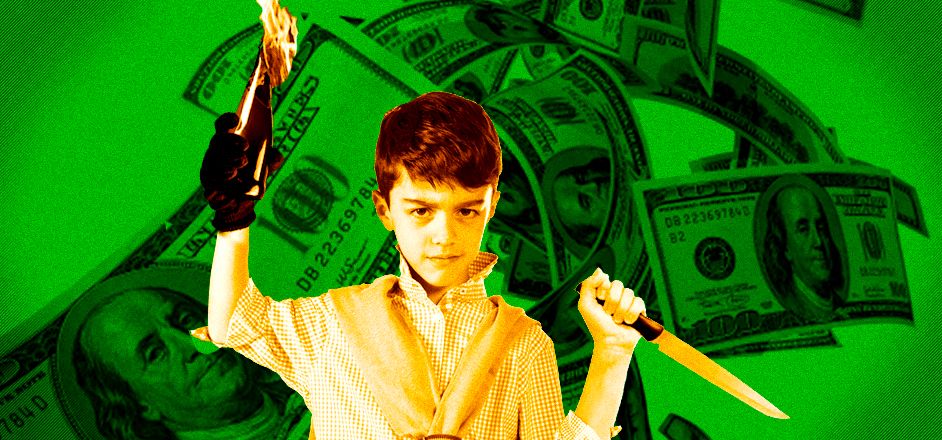When he was just 16 years old, Jake — speaking under anonymity for soon to be obvious reasons — started a weapons-smuggling business at his private high school. He’d drive to the Swap Shop in his brand new BMW, stock up on folding knives and throwing stars, and then stuff them inside the rectums of teddy bears. Between English and Economics class, he’d stand in the garden of a campus pavilion and sell the teddy bears to dozens of pimple-faced prep school boys. Over the course of the year, Jake armed nearly a hundred sadistic teenagers with Swiss Army knives and switchblades.
But the boy can’t be blamed for his idiotic and highly illegal behavior. He suffers from affluenza.
Affluenza a pseudo-psychological condition induced by limitless access to wealth. As the story goes, young men and women who are spoiled rotten by their wealthy parents are more prone to suffer from substance abuse, addiction, depression, and anxiety. Studies suggest their sense of entitlement makes them more prone to misbehavior and leaves them unequipped to deal with hardships on their own. Looking deeper into the psychologically harmful foundation of Jake’s upbringing, it’s not hard to believe his defense, either. And learning the plight of a poor little rich boy may even compel you to feel sympathy for the fortunate.
Jake’s father was the vice-president of a billion-dollar company. He spent much of his childhood in Switzerland, skiing and gorging on cheese fondue. Just when he’d found himself a circle of friends, Jake was told he was moving to another continent. His father needed to relocate for work. So the family abandoned their mountain mansion in the Swiss Alps. And later, after only a year living in a bungalow in Argentina, it was time to leave again.
This cycle continued throughout Jake’s upbringing: an annual abandonment of the life and relationships he’d spent the past year building. Most children, with having friends no longer an option, would look to their parents for love and companionship. But Jake’s parents were never around.
His dad was working every waking minute. And his mother, though not employed, was always traipsing around town to tennis lessons, yoga sessions or the nail salon. Jake’s parents allowed him to entertain himself however he pleased. And over time, his parent’s permissiveness catastrophically deranged his moral compass.
Jake gained a fascination for violence. He could afford any toy, any outfit, or any video game — so those things bored him. One day, after growing disinterested with throwing grenades in Call of Duty, Jake decided he wanted to throw real explosives. He decided to make his own Molotov cocktails. So Jake filled a few of his mother’s empty champagne bottles with gasoline from the shed, stuffed a rag in the top of each bottle, and headed out the door with a lighter in hand.
He didn’t intend to hurt anyone. He’d hidden behind some shrubs in a nearby abandoned lot, lit the fuse of his homemade explosive, and hurled the bottle as far away from himself as possible. The glass shattered in a neighbor’s driveway, engulfing the shrubbery and flower gardens in flames. A lone police officer on horseback happened to notice the blaze, and while he desperately attempted to notify the homeowners and the fire department, Jake escaped unscathed.
Once again, Jake suffered no consequences. Whether selling weapons to his classmates or setting a home on fire, he was never compelled to reflect on the hazards or harm of his idiocracy. A growing list of wrongdoings in which Jake was never held responsible was actively washing away any understanding of right and wrong.
The same pattern of evading repercussions deluded the mind of Ethan Couch, the wealthy teen that popularized the concept of affluenza. In 2013, Ethan drunkenly weaved off the road and into another car in his father’s Ford F-350, killing 4 and gravely wounding 2 others. Couch’s blood alcohol level was 3 times the legal limit, and beyond that, he was high on Valium.
Couch’s attorney used 'affluenza' as the teen’s defense, crediting Couch’s upbringing in a world without consequences as the source of the boy’s under-developed sense of responsibility. The judge in Couch’s case agreed with the defense. Although prosecutors had asked for 20 years in prison, the judge sentenced him to only 10 years of probation.
Couch’s case demonstrates that affluenza holds merit as a defense for wealth-induced delinquency. Fortunately for Jake, he’s only justifying his behavior to his friends, and not to a judge and jury. Jake challenges the idea that affluence can act as a buffer for any hardship. Quite the contrary, money can warp our minds and behavior to the extent that it creates more dangers than it solves.
For that reason, our sympathy should reach beyond those we see as less fortunate. Because if the price of privilege is empathy, morality and psychological stability, perhaps the wealthy aren’t any better off.




Leave a Reply